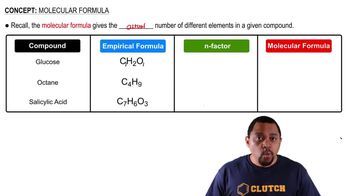Here are the essential concepts you must grasp in order to answer the question correctly.
Mole Concept
The mole is a fundamental unit in chemistry that quantifies the amount of substance. One mole contains approximately 6.022 × 10²³ entities, such as atoms or molecules, known as Avogadro's number. This concept allows chemists to convert between the mass of a substance and the number of particles it contains, facilitating calculations in stoichiometry.
Recommended video:
Molecular Formula
A molecular formula represents the number and type of atoms in a molecule. For example, C₆H₆ indicates that a benzene molecule consists of six carbon atoms and six hydrogen atoms. Understanding molecular formulas is essential for determining the composition of substances and performing calculations related to moles and molecules.
Recommended video:
Determining Molecular Formulas
Conversion Factors
Conversion factors are ratios used to convert one unit of measurement to another. In this context, the conversion from moles to molecules involves using Avogadro's number as a conversion factor. By multiplying the number of moles by 6.022 × 10²³, one can find the total number of molecules present in a given sample.
Recommended video:
 Verified step by step guidance
Verified step by step guidance


